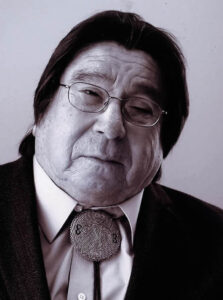Acceptance remarks from 2021 University of Maine Honorary Degree recipient Wayne Newell

Editor’s note: Mr. Newell was unable to join our virtual commencement presentation. He provided the following acceptance remarks.
Hello, my name is Wayne Newell. I currently reside at Indian Township, which is part of the Passamaquoddy community in eastern Maine.
On April 30, 2021, I was pleasantly surprised when I received a letter from President Joan Ferrini-Mundy informing me on behalf of the University of Maine, and with the endorsement of the University of Maine System Board of Trustees and by recommendation of the University of Maine Honorary Degree Committee, (that I would receive) an honorary Doctorate of Humane Letters from the university. I am honored to accept this recognition from the University of Maine.
I have had a lifelong association with the University of Maine, particularly the Orono and Machias campuses. I have been involved in many initiatives, always with the goal of not only educating others, but also myself.
I was involved with many tribal people from the Native communities, as well as university personnel, on the establishment of a Native American program and with the University Trustees Native American Scholarship Program established many years ago. These two initiatives were significant to ensuring the dawn of Wabanaki presence throughout the University System. I would like to recognize the late Ted Mitchell of the Penobscot Nation for the years that he spent as my mentor and Ted’s dedication to mentoring the university community, as well. Ted always played a major role in attracting Native American students to take advantage of university’s educational opportunities.
My work with the Passamaquoddy language and with Native speakers of the Passamaquoddy and Maliseet began a half a century ago, always with the goal that I, and those who worked with me, would leave tools of learning for the coming generations. I have worked with the state and federal Departments of Education and the University System for all to understand that the Passamaquoddy and Maliseet language is a significant road map to the understanding of Native and non-native cultures alike. I was honored to be appointed by two U.S. Presidents, Carter and Obama, to serve on their National Advisory Council on Indian Education. This work has brought me much personal fulfilment in the many educational projects I have been involved with.
Once again, I am very honored to accept this recognition by the University of Maine System and for having had the opportunity to work for many years with so many fellow educators. Kci woliwon (Passamaquoddy translation) — a grand thank you.
